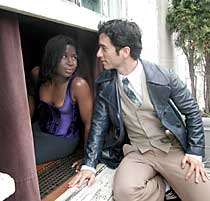This must be the season of the woman –
or the woman playwright.
Kings County Shakespeare Company and Flying Fig Theater are both
presenting obscure plays by female playwrights. Both feature
young ladies determined to defy a father or a brother, avoid
a convent, and marry whom they please. Both take place in sunny
and exotic cities (at least in the eyes of Englishmen). And both
plays feature rogues who are bested – but not bedded by – good
and true women.
’Wonder’ woman
"The Wonder!: A Woman Keeps a Secret," written by Susanna
Centlivre in 1714, is based on the premise that it is the odd
woman who can take charge of her own life and manipulate men
so that she gets her own way. Indeed, this was probably true
in the 18th century.
Today, in Western societies, it is more likely the odd woman
who is dependent on her husband or father and submissive to their
wills. And so, plays like "The Wonder!" have become
period pieces that are only performed by ambitious, academic
or feminist companies like Flying Fig Theater, which is currently
presenting "The Wonder!" at Fort Greene’s South Oxford
Space.
Director Michaela Goldhaber, a Fort Greene resident, has clearly
done her homework on Centlivre and the drama of her time. The
production is replete with robust sword fights, bawdy flirtation
and ironic asides. Add to this Goldhaber’s casting of a racially
diverse group of actors and actresses, and the unique qualities
of this particular theater space – the beautifully restored,
wood-paneled Great Room, with its recessed stage and large windows
that are perfect for hasty and clandestine exits and entrances
– and the production is nothing if not visually arresting.
One must not, however, let the physicality of the "The Wonder!"
distract the mind from the intricate plotting of the play.
Isabella (Lolita Foster) is a young Portuguese noblewoman whose
father, Don Lopez (the superb Roy Thomas), wants her to marry
a wealthy old man whom she has never seen. Desperate to lead
her own life, Isabella runs away to the home of her friend, Violante
(Megan Garcia), a young lady with her own troubles, namely her
father, Don Pedro (Collin Biddle), who wants Violante to enter
a convent so he can get his hands on her inheritance. Now Violante
has to keep Isabella hidden from two furious fathers – hers and
her friend’s, not to mention her own suspicious suitor.
Not too surprisingly, Isabella has a brother, Don Felix (Sekou
Campbell), who is in love with the convent-bound Violante, and
Don Felix has a friend, Frederick (Kevin Reed), who is not so
secretly in love with his sister, Isabella. The faithful friend,
however, has stiff competition that comes from his own friend,
Col. Britton (Carman Lacivita), a Scottish soldier returning
from the war in Spain.
Naturally, everyone has a maid or a footman whose intrigues often
either complicate or facilitate the exploits of their masters.
Although Centlivre seems to cherish the thought of women taking
control of their own destiny, the only way she figures they can
do this is by finding a good man and getting him to marry her.
The women in "The Wonder!" don’t use their considerable
intelligence to run businesses or contribute to the arts and
sciences, but rather to outwit their fathers.
But what the heck. For us in the 21st century, "The Wonder!"
is not so much social commentary as light entertainment – which
was probably exactly what it was meant to be in the first place.
And it’s far better to concentrate on the obvious talent of many
of the actors than to nitpick on the tentative liberties taken
by the playwright.
Campbell and Garcia form a skittish but faithful couple whose
extravagant emotions are the source of much humor. LeeAnne Hutchison
is perfect as Violante’s perky maid, Flora, and Kila Packett
is surely a worthy match as Felix’s footman, Lissardo, who pursues
her.
Lacivita and Gabriel Grilli as his Highlander footman are like
a Scottish Abbot and Costello; their conversation often sounds
like an incomprehensible "Who’s on First?" and gets
the biggest laughs of the show.
Becky Lasky has dressed the cast in believable and colorful,
if not necessarily historically accurate, costumes. But it would
have been helpful if set designer Caitlin McCleery had come up
with a bit more to help the audience figure out where the characters
are and how much time has passed between scenes.
If "The Wonder!" disappoints as feminist propaganda,
it certainly succeeds as lively entertainment. Go see it – and
take your daughters.
Aphra Behn: pioneer
The women-helmed Kings County Shakespeare Company (KCSC) has
proclaimed the theme of its 20th anniversary season to be "Enter
the Actress," dedicating the season to celebrating milestones
for women in classical theater.
One of the first of these milestones is the career of Aphra Behn,
England’s first professional female playwright. Thus KCSC has
opened the festival with Behn’s best known and most popular play,
"The Rover" (1677), directed by Liz Shipman and performed
by KCSC’s junior, non-Equity acting troupe, Thespis. The production
is now onstage at the Founders Hall theater of St. Francis College,
where KCSC is in residence.
Behn had several other careers in addition to playwriting, most
notably that of a spy serving Charles II in Antwerp. One can
only hope she was a better spy than playwright.
Behn lived and wrote during the English Restoration. It was a
period known for licentiousness and frivolity, in drama marked
by the comedies of manners written by the likes of William Congreve,
whose comedies took a cynical, light-hearted look at the ways
of the world.
In many aspects, "The Rover," with its intrigues, betrayals
and constant allusions to sex and the battle between the sexes,
is indeed representative of Restoration drama. But while a playwright
like Congreve wrote carefully constructed comedies with scintillating
dialogue, Behn relies mostly on the kind of "dirty talk"
that led Alexander Pope to call her a loose woman who "fairly
puts all characters to bed." It’s sort of like the difference
between "Man of La Mancha" and "Grease."
What’s more, Behn’s plot is so complicated and her characters
so numerous, it’s often difficult to figure out who’s who, what’s
what, or why the audience should care.
For the most part, the play concerns the forbidden romance of
Florinda (Brie Eley) a young noblewoman of Naples, and Belvile
(Frank Smith) an English colonel whom her brother, Don Pedro
(Achilles Vatrikas), deems an unworthy husband for his sister
and an undesirable brother-in-law for himself. In contrast to
the steadfast Belvile, Wilmore the Rover (Jon Fordham), is a
rogue who, along with his band of merry-making friends, is forever
on the prowl for a new woman who might succumb to his advances.
During what may be less than 24 hours at Carnivale (a time when
men and women – whose identities are concealed by festive masks
– freely ramble and romp in pursuit of not-quite-innocent fun),
he manages to entice the famous courtesan Angelica Bianca (Tessa
Martin), whom he "beds," and beguile the chaste Hellena
(Sabrina Mess), whom he does not.
There’s lots of what the company calls "bad Errol Flynn"
sword fighting. It’s hard to disagree with this description,
but one cannot help but wonder why choreographer Lucie Chin didn’t
do the audience a big favor by trying her hand at good Errol
Flynn dueling.
There’s also a bit of couples (wink, wink) disappearing behind
discreet curtains and plenty of groping in front of the curtains.
All of which is meant to show that men only want sex and women
only want money (if they are less than virtuous) and security
(if they are more than mercenary).
If in Behn’s own time she was accused of indecency for her advocacy
of equality between the sexes and her preoccupation with sex,
KCSC’s characterization of Behn as a kind of proto-feminist is
equally absurd. Just think – it’s the chaste, though playful,
Hellena who gets her man and not the freewheeling Angelica Bianca.
Nor is the clumsy plotting and poorly developed characters of
"The Rover" helped by the relative inexperience of
the cast. who, with the notable exceptions of the saucy Mess
and the salacious Fordham, sometimes seemed to have needed a
few more days’ rehearsal before opening night.
"The Rover" may be an important historical piece, but
it is surely a work of doubtful literary merit.
Flying Fig Theater’s production of "The
Wonder!: A Woman Keeps a Secret" plays through June 30,
Fridays, Saturdays and Mondays at 8 pm, and Sundays at 7 pm,
at New York South Oxford Space, 138 South Oxford St. at Atlantic
Avenue. Tickets are $15. There will be a panel discussion on
playwright Susanna Centlivre on Sunday, June 22 at 4 pm; tickets
$5. For tickets, call (212) 868-4444.
The Kings County Shakespeare Company’s production of "The
Rover" plays through June 29, Mondays and Wednesdays through
Saturdays at 8 pm, matinees on Saturday, June 21, and all three
Sundays at 2 pm at Founders Hall theater, St. Francis College,
182 Remsen St. at Clinton Street. Tickets are $15, $7 seniors
and students (not recommended for children under 12). For tickets,
call Smarttix at (212) 868-4444 or visit www.smarttix.com.

























